



English language translation copyright 2009 by Charles Simic All rights reserved Manufactured in the United States of America First Edition 09 10 11 12 7 6 5 4 3 2 1 For information about permission to reuse any material from this book please contact The Permissions Company at . Publications by BOA Editions, Ltd.a not-for-profit corporation under section 501 (c) (3) of the United States Internal Revenue Codeare made possible with funds from a variety of sources, including public funds from the New York State Council on the Arts, a state agency; the Literature Program of the National Endowment for the Arts; the County of Monroe, NY; the Lannan Foundation for support of the Lannan Translations Selection Series; the Sonia Raiziss Giop Charitable Foundation; the Mary S. Mulligan Charitable Trust; the Rochester Area Community Foundation; the Arts & Cultural Council for Greater Rochester; the Steeple-Jack Fund; the Ames-Amzalak Memorial Trust in memory of Henry Ames, Semon Amzalak and Dan Amzalak; and contributions from many individuals nationwide. Cover Design: Sandy Knight Cover Art: Girl Art Dress and Bicycle by Belinda Bryce Interior Design and Composition: Richard Foerster Manufacturing: BookMobile BOA Logo: Mirko Library of Congress Cataloging-in-Publication Data Tadi, Novica, 1949 Dark things / Novica Tadic ; translated by Charles Simic. p. (The Lannan translations selections series ; no. 15) ISBN 9781934414231 (pbk.) I. Title. Title.
PG1419.3.A32T3613 2009 891.8'216dc22 2008034422  BOA Editions, Ltd. Nora A. Jones, Executive Director/Publisher Thom Ward, Editor/Production Peter Conners, Editor/Marketing Glenn William, BOA Board Chair A. Poulin, Jr., Founder (19381996) 250 North Goodman Street, Suite 306 Rochester, NY 14607 www.boaeditions.org
BOA Editions, Ltd. Nora A. Jones, Executive Director/Publisher Thom Ward, Editor/Production Peter Conners, Editor/Marketing Glenn William, BOA Board Chair A. Poulin, Jr., Founder (19381996) 250 North Goodman Street, Suite 306 Rochester, NY 14607 www.boaeditions.org  Table of Contents
Table of Contents
Guide
I NTRODUCTION

If Hieronymus Bosch had gotten around to writing poems, I suspect they would have sounded like Novica Tadi. We live in a world which resembles one of his canvases. Likewise, for the reader of Tadis poems the setting is unmistakably todays Belgrade, but we may as well be in hell.
Devils roam the dark streets preying upon the innocent. There are fires, rundown buildings, seedy taverns, and crowds of homeless, cantankerous people. The atmosphere is oppressive and claustrophobic. Black walls close in on all sides. Every room feels like a prison cell. Its hard to tell bad dreams from reality.
Nothing is what it seems to be. Everyone seems to be wearing a mask. A nameless recluse, mistrustful and fearful, is our guide. Hes like Saint Anthony in one of the old masters paintings which depict various temptations by the devil. Like Anthony, our nameless guide is surrounded on all sides by monsters and apparitions generated by his vivid, guilt-ridden imagination. The poems tell us how he copes in such a world, how he spends his days and nights.
Here is the poem Armful of Twigs, Dream: Armful of dry twigs I carry to the fire through busy streets. I cant see the stake, dont know who is being burnt alive or why. Flames rise and the glow beyond the ecstatic crowd singing, shouting and firing guns. (This dream, I am not bound to forget.) Dont sway like that, O my curtain. Tadi is a poet of the dark night of history. His protagonist, like the condemned Christ in some painterly depiction of Ecce Homo, is surrounded by an enraged mob, who, although wretched themselves, yearn to make his last moments even more miserable.
The tormenting of the helpless is Tadis recurrent theme. Cruelty and madness rule in his world. He is aware of the enormity of wickedness of which human beings are capable. Each one of his poems, even without being in any way historically specific, is a little tableau of some depravity or a nightmarish prophesy of some horror still to come. The most astonishing aspect of Tadis poetry is its single-mindedness. Since his first published book in 1974, he has stuck to his uncompromising vision of the world teeming with evil.
Is he a political poet? Yes and no. Is he a religious poet? Again, the label doesnt quite fit. In an early poem, Tadis protagonist prays to the Lord to disfigure him and cover him with boils. In his later poems, God seems more remote, and, as always, silent. The devil is most certainly still in business, perhaps not the original devil, but human beings who have taken his place. For anyone capable of moral outrage, the world we live in is an appalling spectacle.
In a volume published in 1992, I translated Tadis earlier books, so the selection here concentrates on his most recent collections. Even though his poems have grown less verbally intricate and more direct and plain-spoken over the years, he is still difficult to translate. At first glance, the poems brevity and limited vocabulary suggest otherwise. The language is simple, the phrasing idiomatic, but there are vestiges of folk poetry, folk sayings, and the Bible. Every once in a while Tadi will use an uncommon word or twist the syntax in an odd way to take the poem out of the realm of the familiar. Since his aim is extreme concision and lyric purity, theres very little room to maneuver.
I venerate accuracy in translation and believe the supreme authority for a translator ought to be the authors style and form. Strict literalismword for word, phrase for phrase is my rule, until I get stuck. It pains me to take even the smallest liberties, but in some cases they are unavoidable, since to remain faithful to the original would have made the poem in translation sound awkward. Even with that, there were poems of his that I greatly admired and just could not do justice to and had to abandon. The more original a poets relationship to his native language is, the harder he is to translate. My sincerest hope is that in a few of the poems here, Ive done this great Serbian poet justice.
Charles Simic C OAT OF M ANY C OLORS  I found on the dump a coat of many colors and put it on. I shrieked with happiness and whirled around for a long time. To show myself off to people and stars in the sky is my wish now. And as I walk the streets, to see my reflection in shop windows full of miserable novelties. S UN S S HAME
I found on the dump a coat of many colors and put it on. I shrieked with happiness and whirled around for a long time. To show myself off to people and stars in the sky is my wish now. And as I walk the streets, to see my reflection in shop windows full of miserable novelties. S UN S S HAME  I live in an egg-shaped room lined with rags bandages ice fog lined with old newspapers lined with mice fur the flag of nighthawks In the morning when I crack the window open suns shame breaks over me like cold sweat. C ONVERSATION (1)
I live in an egg-shaped room lined with rags bandages ice fog lined with old newspapers lined with mice fur the flag of nighthawks In the morning when I crack the window open suns shame breaks over me like cold sweat. C ONVERSATION (1) 

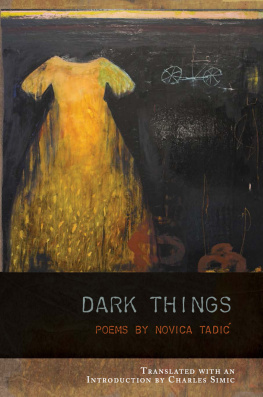
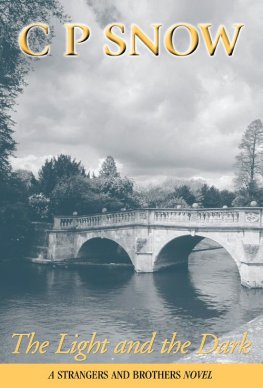

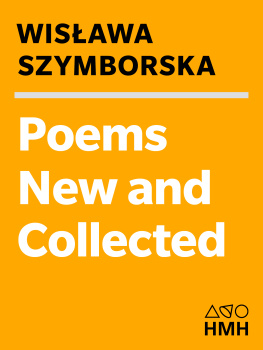
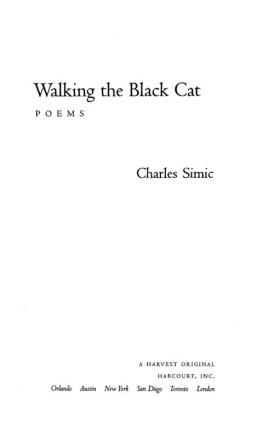
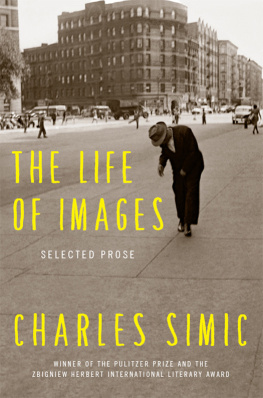
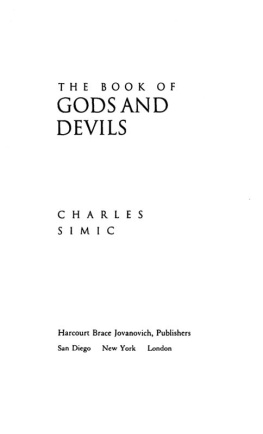



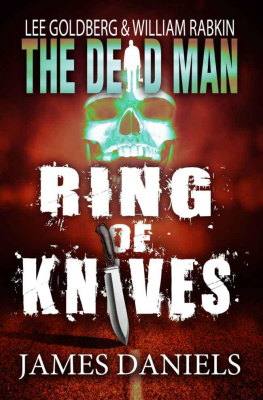



 English language translation copyright 2009 by Charles Simic All rights reserved Manufactured in the United States of America First Edition 09 10 11 12 7 6 5 4 3 2 1 For information about permission to reuse any material from this book please contact The Permissions Company at . Publications by BOA Editions, Ltd.a not-for-profit corporation under section 501 (c) (3) of the United States Internal Revenue Codeare made possible with funds from a variety of sources, including public funds from the New York State Council on the Arts, a state agency; the Literature Program of the National Endowment for the Arts; the County of Monroe, NY; the Lannan Foundation for support of the Lannan Translations Selection Series; the Sonia Raiziss Giop Charitable Foundation; the Mary S. Mulligan Charitable Trust; the Rochester Area Community Foundation; the Arts & Cultural Council for Greater Rochester; the Steeple-Jack Fund; the Ames-Amzalak Memorial Trust in memory of Henry Ames, Semon Amzalak and Dan Amzalak; and contributions from many individuals nationwide. Cover Design: Sandy Knight Cover Art: Girl Art Dress and Bicycle by Belinda Bryce Interior Design and Composition: Richard Foerster Manufacturing: BookMobile BOA Logo: Mirko Library of Congress Cataloging-in-Publication Data Tadi, Novica, 1949 Dark things / Novica Tadic ; translated by Charles Simic. p. (The Lannan translations selections series ; no. 15) ISBN 9781934414231 (pbk.) I. Title. Title.
English language translation copyright 2009 by Charles Simic All rights reserved Manufactured in the United States of America First Edition 09 10 11 12 7 6 5 4 3 2 1 For information about permission to reuse any material from this book please contact The Permissions Company at . Publications by BOA Editions, Ltd.a not-for-profit corporation under section 501 (c) (3) of the United States Internal Revenue Codeare made possible with funds from a variety of sources, including public funds from the New York State Council on the Arts, a state agency; the Literature Program of the National Endowment for the Arts; the County of Monroe, NY; the Lannan Foundation for support of the Lannan Translations Selection Series; the Sonia Raiziss Giop Charitable Foundation; the Mary S. Mulligan Charitable Trust; the Rochester Area Community Foundation; the Arts & Cultural Council for Greater Rochester; the Steeple-Jack Fund; the Ames-Amzalak Memorial Trust in memory of Henry Ames, Semon Amzalak and Dan Amzalak; and contributions from many individuals nationwide. Cover Design: Sandy Knight Cover Art: Girl Art Dress and Bicycle by Belinda Bryce Interior Design and Composition: Richard Foerster Manufacturing: BookMobile BOA Logo: Mirko Library of Congress Cataloging-in-Publication Data Tadi, Novica, 1949 Dark things / Novica Tadic ; translated by Charles Simic. p. (The Lannan translations selections series ; no. 15) ISBN 9781934414231 (pbk.) I. Title. Title.  BOA Editions, Ltd. Nora A. Jones, Executive Director/Publisher Thom Ward, Editor/Production Peter Conners, Editor/Marketing Glenn William, BOA Board Chair A. Poulin, Jr., Founder (19381996) 250 North Goodman Street, Suite 306 Rochester, NY 14607 www.boaeditions.org
BOA Editions, Ltd. Nora A. Jones, Executive Director/Publisher Thom Ward, Editor/Production Peter Conners, Editor/Marketing Glenn William, BOA Board Chair A. Poulin, Jr., Founder (19381996) 250 North Goodman Street, Suite 306 Rochester, NY 14607 www.boaeditions.org  Table of Contents
Table of Contents If Hieronymus Bosch had gotten around to writing poems, I suspect they would have sounded like Novica Tadi. We live in a world which resembles one of his canvases. Likewise, for the reader of Tadis poems the setting is unmistakably todays Belgrade, but we may as well be in hell.
If Hieronymus Bosch had gotten around to writing poems, I suspect they would have sounded like Novica Tadi. We live in a world which resembles one of his canvases. Likewise, for the reader of Tadis poems the setting is unmistakably todays Belgrade, but we may as well be in hell.